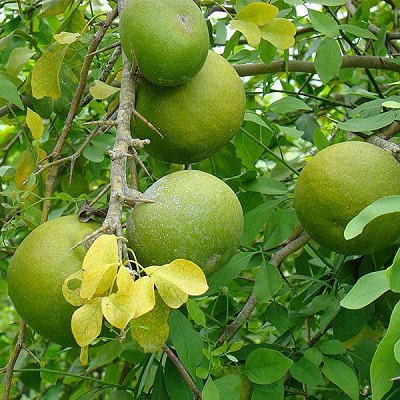- +033 2572 7171
- info@dhanvantary.com

4.5 Rating | 4500 Review

4.5 Rating | 4500 Review
Bael is a spinous deciduous and aromatic tree with long, strong and axillary spines. This Bael tree grows up to 18mt in height and thickness of tree is about 3-4ft. Bael Leaves are 3-5 foliate, leaflets are ovate and have typical aroma. Bael Flowers are greenish white in color and sweet scented. Bael Fruits are large, woody, greyish yellow, 8-15 celled and have sweet gummy orange colored pulp. Bael Seeds are compressed, oblong and numerous found in aromatic pulp.

Bael is also known as Bilva in Sanskrit language. In Ayurveda, it is more commonly known by the same name. This herb has great medicinal, spiritual and religious significance. Bilva fruits and Bilva leaves are considered sacred and used as offerings to the Hindu
Gods like Lord Shiva. This is why it is also known as “Shiva druma” or the tree of Shiva in ancient scriptures.
Bilva is also known for its great properties of keeping blood sugar levels under control for which it is being explored far and wide. It is also great for digestion and helps to keep the intestines healthy.
Different parts of this herb are used for different purposes. Its fruit is relished as a whole as well as for its chilled juice which is very good to beat the heat in hot and scorching summers like those of northern India.
The leaves are also a significant contributor to the many beneficial properties that Bilva herb exhibits. Old yellow fruits of this tree turns green after one year. It contains tannic acid, volatile oil and mucilaginous liquid.
Kingdom
Plantae
Order
Sapnidales
Family
Rutaceae
Bilva is a very common herbaceous plant native to Bangladesh, Sri-Lanka and India. It grows in most parts of the Indian sub-continent, Myanmar and South – East Asia. Forests on hills and Rajasthan is suitable climate for this tree. This herb is also distributed in other countries such as Pakistan, Nepal, Philippines, Fiji, Cambodia and Thailand.
|
Hindi / Sanskrit |
English |
||
|
Rasa |
Katu, Tikta, Kashaya |
Taste |
Pungent, Bitter, Astringent |
|
Guna |
Grahi, Snigdha, Tikshna |
Physical Property |
Absorbent, Unctuous, Sharp |
|
Virya |
Ushna |
Potency |
Hot |
|
Vipaka |
Katu |
Metabolic Property (After Digestion) |
Pungent |
It balances tridosha.
|
Charak Samhita |
Sushrut Samhita |
|
Varunadi, Ambashtadi, Brihat panchmoola, Dashmoola |
